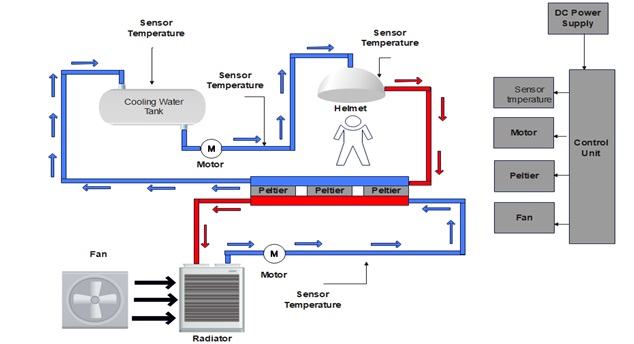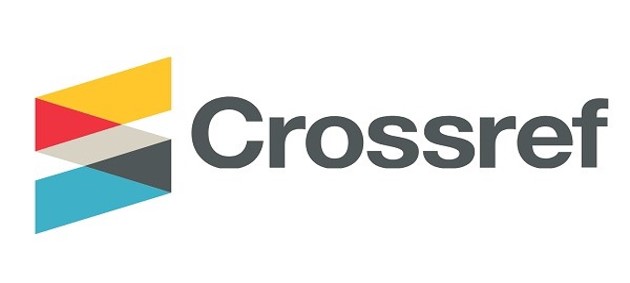Peltier Elements-based Human Brain Hypothermia Treatment
DOI:
https://doi.org/10.51173/jt.v4i4.723Keywords:
Arduino Microcontroller, Helmet, Hypothermia Brain, Peltier, Temperature SensorAbstract
Cooling and hypothermia of the brain is an important and effective way to save the lives of many patients suffering from diseases such as strokes, epilepsy, incurable diseases, and others due to general accidents. Brain cells are also weak and sensitive to changes and fluctuations in human temperature. In this work, a hypothermia device was designed and practically implemented to reduce the brain and body temperature. It mainly consists of temperature sensors for measuring water and patient temperature, a Helmet made of plastic tubes with a thermal coefficient suitable for absorbing heat, cold water is circulated inside the tubes to cool the head, and the cooling is done through Peltier elements in the device. The Arduino microcontroller controls the system. The experimental results showed a decreasing in brain temperature to 36.5 °C within a cooling time of 12 minutes. The effectiveness of the proposed system was also validated by comparing the findings with the previous system in terms of temperature and cooling time.
Downloads
References
D. Sung, P. A. Kottke, B. B. Risk, J. W. Allen, F. Nahab, A. G. Fedorov, et al., "Personalized predictions and non-invasive imaging of human brain temperature," Communications Physics, vol. 4, pp. 1-10, 2021.
N. E. Dzulfaijah, M. Mardiyono, S. Sarkum, and D. Saha, "Combination Of Cold Pack, Water Spray, And Fan Cooling On Body Temperature Reduction And Level Of Success To Reach Normal Temperature In Critically Ill Patients With Hyperthermia," Belitung Nursing Journal, vol. 3, pp. 757-764, 2017.
V. Cojocaru, T. Fedorisin, E. Niguleanu, and R. Galus, "Intelligent device for controlled therapeutic hypothermia," in 2018 10th International Conference on Electronics, Computers and Artificial Intelligence (ECAI), 2018, pp. 1-6.
S. Ufoaroh and P. Nnadikwe, "Intelligent Patient Monitoring System for Heartbeat and Temperature with Wireless Emergency Alarm, "IRE Journals, vol.4, pp. 174-177,2021
V. P. Cojocaru, S. Groppa, A. S. Sidorenko, T. Fedorisin, R. Galus, and E. Niguleanu, "Device for controlled hypothermia," 6th International Conference “Telecommunications, Electronics and Informatics (ICTEI), 2018, pp. 372-374.
E. Sh. Usmanov, MA. Chubarova, and Sh. Kh. Saidov, "Emerging trends in the use of therapeutic hypothermia as a method for Neuroprotection in brain damage" Modern Technologies in Medicine, vol. 12, pp. 94-104, 2020.
V. Cojocaru and D. Vrabii, "Simulations of the effect of the cooling elements' temperature on the hypothermia efficiency," in 2017 E-Health and Bioengineering Conference (EHB), 2017, pp. 13-16.
L. Cao, J. Han, L. Duan, and C. Huo, "Design and experiment study of a new thermoelectric cooling Helmet," Procedia Engineering, vol. 205, pp. 1426-1432, 2017.
A. H. Yavuz, "Design of a fuzzy logic controlled thermoelectric brain hypothermia system," Turkish Journal of Electrical Engineering & Computer Sciences, vol. 24, pp. 4984-4994, 2016.
J. J. Kim, N. Buchbinder, S. Ammanuel, R. Kim, E. Moore, N. O’Donnell, et al., "Cost-effective therapeutic hypothermia treatment device for hypoxic ischemic encephalopathy," Medical Devices (Auckland, NZ), vol. 6, p. 1, 2013.
V. Cojocaru and V. Mardari, "Fuzzy controlled system for hypothermic brain therapy," Proceedings of the Romanian Academy-Series A, vol. 15, pp. 396-402, 2014.
K. A. Hassan, H. N. Abdullah, and S. A. Abd-AlHameed, "IoT Based Brain Hypothermia Monitoring and Controlling Management System," Turkish Journal of Computer and Mathematics Education (TURCOMAT), vol. 12, pp. 892-898, 2021.
M. Kapıdere, R. Ahıska, and İ. Güler, "A new microcontroller-based human brain hypothermia system," Journal of Medical Systems, vol. 29, pp. 501-512, 2005.
H. Imoto, M. Fujii, J. Uchiyama, H. Fujisawa, K. Nakano, I. Kunitsugu, et al., "Use of a Peltier chip with a newly devised local brain–cooling system for neocortical seizures in the rat," Journal of neurosurgery, vol. 104, pp. 150-156, 2006.
R. Ahiska, A. Yavuz, M. Kaymaz, and İ. Güler, "Control of a thermoelectric brain cooler by adaptive neuro-fuzzy inference system," Instrumentation Science and Technology, vol. 36, pp. 636-655, 2008.
H. Wakamatsu and T. Utsuki, "Development of a basic air-cooling fuzzy control system for hypothermia," Artificial Life and Robotics, vol. 14, pp. 311-317, 2009.
E. Giuliani, S. Magnoni, M. Fei, A. Addis, R. Zanasi, N. Stocchetti, et al., "A novel cooling device for targeted brain temperature control and therapeutic hypothermia: feasibility study in an animal model," Neurocritical care, vol. 25, pp. 464-472, 2016.
G. F. Cattaneo, A. M. Herrmann, S. A. Eiden, M. Wieser, E. Kellner, S. Doostkam, et al., "Selective intra-carotid blood cooling in acute ischemic stroke: A safety and feasibility study in an ovine stroke model," Journal of Cerebral Blood Flow & Metabolism, vol. 41, pp. 3097-3110, 2021.
Y. Duan, D. Wu, M. Huber, J. Shi, H. An, W. Wei, et al., "New endovascular approach for hypothermia with intrajugular cooling and neuroprotective effect in ischemic stroke," Stroke, vol. 51, pp. 628-636, 2020.
L. Rivera-Lara, J. Zhang, and S. Muehlschlegel, "Therapeutic hypothermia for acute neurological injuries," Neurotherapeutics, vol. 9, pp. 73-86, 2012.
S. M. Seyedsaadat, S. F. Marasco, D. J. Daly, R. McEgan, J. Anderson, S. Rodgers, et al., "Selective brain hypothermia: feasibility and safety study of a novel method in five patients," Perfusion, vol. 35, pp. 96-103, 2020.
S. Zambrano-Becerra, P. Galvis-Sanchez, N. Perez-Rangel, E. Florez-Solano, and E. Espinel-Blanco, "Development of an integrated cooling system for motorcycle helmet by physical study of temperature variations and heat transfer," in Journal of Physics: Conference Series, 2022, p. 012010.
N. S. Mazalan, G. J. Landers, K. E. Wallman, and U. Ecker, "Head cooling prior to exercise in the heat does not improve cognitive performance," Journal of Sports Science & Medicine, vol. 20, p. 69, 2021.
S. Zambrano-Becerra, P. Galvis-Sánchez, and N. Perez-Rangel, "Design of an integrated cooling system by means of thermal variation flows," in Journal of Physics: Conference Series, 2020, p. 012018.
A. S. T. Eldho, J. T. Paul, K. John, J. Jose, and B. Paul, "Design and analysis of a smart-attachment to jacket and helmet used by two-wheeler riders using Peltier-module," Materials Today: Proceedings, vol. 42, pp. 862-869, 2021.
W. Hu, Z. Liu, M. Yuan, Y. Peng, X. Meng, and C. Hou, "Composite design and thermal comfort evaluation of safety helmet with phase change materials cooling," Thermal Science, vol. 25, pp. 891-900, 2021.
O. Mellin and F. Muret, "Driving a Peltier Element (TEC): Efficiency and Aging," Application Report, Texas Instruments Go to reference in article, TEXAS INSTROMENT,2020.
H. S. Dizaji, S. Jafarmadar, S. Khalilarya, and S. Pourhedayat, "A comprehensive exergy analysis of a prototype Peltier air-cooler; experimental investigation," Renewable energy, vol. 131, pp. 308-317, 2019.
L. Cui, R. Miao, K. Wang, D. Thompson, L. A. Zotti, J. C. Cuevas, et al., "Peltier cooling in molecular junctions," Nature nanotechnology, vol. 13, pp. 122-127, 2018.
Q. IRKT, "1.3 Peltier Cooling," Flexible Thermoelectric Polymers and Systems, vol. 2, p. 35, 2022.
R. Saha, S. Biswas, S. Sarmah, S. Karmakar, and P. Das, "A Working Prototype Using DS18B20 Temperature Sensor and Arduino for Health Monitoring," SN Computer Science, vol. 2, pp. 1-21, 2021.
Alimuddin, R. Arafiyah, Y. Maryani, I. Saraswatia, Masjudin, and Mustahal, "Applications of temperature sensor cultivation fish and plant aquaponic with greenhouse for local food innovation," in AIP Conference Proceedings, 2021, p. 060013.
F. Shi, C. Yang, M. Liu, and R. Fan, "Research and Application on the Relay Protection Setting Comparison System Based on Fuzzy Matching," in IEEE 4th Conference on Energy Internet and Energy System Integration (EI2), 2020, pp. 2119-2123.
J.-H. Kima, J. S. Parka, B. J. Hyona, J.-H. Choia, and I.-S. Junga, "Development of BLDC Drive for Appliance Applications," Proceedings of the 4th IIAE International Conference on Industrial Application Engineering 2016, pp. 494-498.
R. P. L. Prakash, M. Selvam, A. A. S. Pandian, S. Palani, and K. Harish, "Design and modification of radiator in IC engine cooling system for maximizing efficiency and life," Indian Journal of Science and Technology, vol. 9, pp. 1-2, 2016.
K. Zafren, R. Lechner, P. Paal, H. Brugger, G. Peek, and T. Darocha, "Induced Hypothermia to as Cold as 3° C in Humans: Forgotten Cases Rediscovered," High Altitude Medicine & Biology, vol. 23, pp. 105-0113, 2022.

Downloads
Published
How to Cite
Issue
Section
License
Copyright (c) 2022 Rabab Talib Abdullah, Sadik Kamel Gharghan, Ahmed J. Abid

This work is licensed under a Creative Commons Attribution 4.0 International License.
















